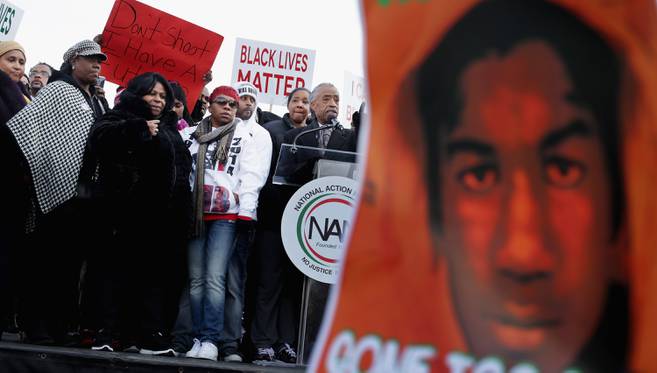
“I can’t breathe.”
It’s brutally ironic that these three desperate words were among the last utterances of at least three Black men — that we know of — who died after encounters with police: Eric Garner in 2014, George Floyd in 2020 and Freddie Gray here in Baltimore in 2015.
Only Garner is featured in Atlanta-based composer Joel Thompson’s 2015 moving work, “Seven Last Words Of The Unarmed,” but the fact that Gray, Floyd and so many others have died similarly since then is not lost on Baltimore Choral Arts Society music director Anthony Blake Clark. Each final utterance — such as “Why do you have your guns out?,” “What are you following me for?” and “Mom, I’m going to college” — is sung mournfully and repetitively by a choir, elevating them to a place of artistic and cultural importance.
They are important.
“We are living in the city of Freddie Gray,” said Clark, whose group is presenting a provocative performance Sunday at the Johns Hopkins University’s Shriver Hall auditorium called “Human Requiem.” The seven movements of Thompson’s piece, which feature the words of the late Kenneth Chamberlain Sr., Trayvon Martin, Amadou Diallo, Michael Brown, Oscar Grant, John Crawford and Garner, will be interspersed with German composer Johannes Brahms’ “Ein deutsches Requiem“ (or “A German Requiem”) as the hall reflects images by visual designerCamilla Tassi.
“It would be relevant even if these things had ceased to happen,” Clark told me. They have not.
This subject is a rough one for me, both as a Baltimorean who helplessly watched the uprising in my native city from hundreds of miles away in Florida, and as the mother of a Black son whose growing autonomy terrifies me. My heart stops beating when he leaves my presence, and doesn’t resume until he’s back in it.
The number of men and women who’ve died since “Seven Last Words” was composed but could have been part of this work is large. And exhausting. And I don’t know what the hell to do, so I guess art must fill in the ragged gaps.
“Human Requiem” is a solemn musical reflection on death, grief and the way we reconcile those concepts in a culture that’s very bad at it. Clark said he was struck by the parallels of two pieces in evoking religious iconography. “Seven Last Words” references the last words of Jesus, which churches often present in musical performances and sermons on Good Friday, while a requiem is traditionally part of a funeral mass.
“To me, there is an interesting dichotomy to have a piece written in this century’s dialogue with one written in the 1860s, on a different continent,” Clark said Brahms wrote his piece following the death of his mother and “called this piece a requiem, but despite the name there are no characteristics of a funeral mass for the dead. … It never talks about Jesus or Christ. It has spiritual themes of death and loss, and a recognition of coming to terms with grief and bereavement. It’s how one might move forward while still being steeped in pain and death and life.”
Thompson’s work is also about death and the need to “mourn and move forward and not forget,” but centers the modern urgency of the situation, that “seven people lost their lives for no reason,” Clark said. “We can either give up, or [take it] as the impetus to do something. It does a masterful job of taking this horrific reality of being human. People die. We die, and then frame [that death] in a way we can deal with.”
Clark hopes that “Human Requiem” might be “an entry” point for “people who don’t normally go to classical or choral concerts. … I feel such a a gratitude, such an indebtedness to people who love choral music. There is a reason that these amazing masterworks still have resonance today. If we can make a dialogue between an older piece of music and a contemporary issue, it can be really powerful,” he said. “Look at all we can learn from this work. It’s evergreen. We can still be, say, impacted by Shakespeare. If we need to set it to rap music or put its setting in outer space, I’m for it. Let’s do it.”
It reminds me of when I took my son, who was 9 at the time, to see Chesapeake Shakespeare Company’s recent “Hamlet,” with modern costuming but with the full force the Bard’s language. My son was bored at first but soon realized that it was a crime drama with intrigue and stabbing and could not get enough.
To be clear, I don’t think the so-called classics are important just because they’re old; “The Birth of A Nation” is old, too, and it’s trash. But I agree with Clark’s vision of finding creative ways to expose the unfamiliar to worthwhile treasures that deserve to exist after we are gone.
“Human Requiem” is an effort to not just make sure that music survives, but that the lost souls whose last words are referenced therein are not forgotten. That we bear witness.
“We have to keep saying their names,” Clark said, “so that they can be a shining light on what we need to fix.”
“Human Requiem” will be performed at 3 p.m. on Nov. 5 at Shriver Hall auditorium at the Johns Hopkins University (3101 Wyman Park Drive in Baltimore). Tickets range from $25-$40.




